| Srl | Item |
| 1 |
ID:
133755
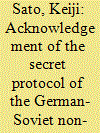

|
|
|
|
|
| Publication |
2014.
|
| Summary/Abstract |
In June 1989, the First Congress of People's Deputies of the Soviet Union established the Commission for Historical and Legal Estimation of the Soviet-German Non-aggression Pact of 1939. In the commission, representatives from Estonia, Latvia and Lithuania condemned the Soviet annexation of the Baltic States, prompting heated arguments regarding the invalidity of the related secret protocol of the pact with other members who continued to hold the traditional Soviet ideological view of the pact as something positive. The debate over the secret protocol had the further potential to extend to disputes over 'recovery of lost territory' amongst the Baltic States, Ukraine, Moldova, Belarus and Russia. This article analyses the arguments used by commission members, considering the interplay of national interests, how they balanced arguments between restoration of 'state sovereignty' and maintenance of borders, and how they finally compromised and concluded the commission's report.
|
|
|
|
|
|
|
|
|
|
|
|
|
|
|
|
| 2 |
ID:
133752
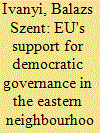

|
|
|
|
|
| Publication |
2014.
|
| Summary/Abstract |
The European Union seems to place an increasing rhetorical emphasis on harnessing the transition experience of the new member states. This article examines whether the EU actually makes use of this experience in its promotion of democratic governance in the eastern neighbourhood. The main conclusion is that while reform priorities of the EU in the region are aligned with transition experience, the actual participation of actors from the new members in implementing EU-financed projects aimed at promoting democratic governance is limited. This contradiction should be resolved or it will further erode the credibility of the EU's external policies.
|
|
|
|
|
|
|
|
|
|
|
|
|
|
|
|
| 3 |
ID:
133748
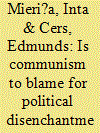

|
|
|
|
|
| Publication |
2014.
|
| Summary/Abstract |
In this article, we apply a new, original technique of cohort analysis to test empirically whether political disenchantment in the post-communist countries of Central and Eastern Europe can be linked to the previous political culture. On the basis of International Social Survey Programme 1996 and 2006 data we find a surprisingly similar and unique cohort effect in all analysed post-communist countries, reflecting persistent generational differences in perceived political competence (interest and understanding of political processes). However, the communist legacy does not seem to be important for explaining low self-efficacy or distrust in political authorities and their responsiveness to citizens' demands.
|
|
|
|
|
|
|
|
|
|
|
|
|
|
|
|
| 4 |
ID:
133756
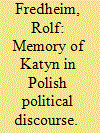

|
|
|
|
|
| Publication |
2014.
|
| Summary/Abstract |
This study uses quantitative methods to explore how the memory of Katyn is mobilised in political discourse. The scholarly literature on memory conflict tends to see international memory disputes as an expression of a state's interests as a whole; this study analyses when hostile rhetoric is mobilised and finds that in Poland Katyn is invoked as part of an opposition strategy that criticises the incumbent regime for undermining the national interest. Periods of accelerated debate about the significance of Katyn have occurred as political elites sought to achieve specific domestic rather than foreign political goals.
|
|
|
|
|
|
|
|
|
|
|
|
|
|
|
|
| 5 |
ID:
133750


|
|
|
|
|
| Publication |
2014.
|
| Summary/Abstract |
Both the Russian public and its elites were taken by surprise by the fact that Russia has become an immigration country. It has resulted in widespread anti-immigrant sentiments and inconsistency in government actions. Russian immigration politics, as well as immigration politics in liberal democracies of the West, are characterised by a wavering between protectionist and liberal laissez faire approaches. This leads to a mismatch between public rhetoric and legal decisions. However, two features seem to make the Russian situation specific: open borders with most of the countries of the former Soviet Union and omnipresent corruption. Corruption results in a discrepancy between formal (legal) decisions and informal (illegal) practices.
|
|
|
|
|
|
|
|
|
|
|
|
|
|
|
|
| 6 |
ID:
133751
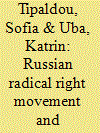

|
|
|
|
|
| Publication |
2014.
|
| Summary/Abstract |
This article examines how, if at all, the mobilisation of the Russian Movement Against Illegal Immigration has had an impact on changes in Russian policies. Little is known about the outcomes of radical right movements in general or the Russian radical right in particular. The Movement Against Illegal Immigration has arguably played a role in shaping negative public attitudes towards immigration. On the other hand, the Russian government has not adopted any clear nationalistic anti-immigration policy frame. We show that disruptive events of Movement Against Illegal Immigration's mobilisation have caused reactions in terms of the elite discourse on immigration and restrictive immigration legislation.
|
|
|
|
|
|
|
|
|
|
|
|
|
|
|
|
| 7 |
ID:
133754


|
|
|
|
|
| Publication |
2014.
|
| Summary/Abstract |
The article concentrates on recent successes of non-partisans (independents) in Polish local government. A majority of mayors and councillors remains unaffiliated with any party-in this respect Poland is an outlier among European countries. The article examines both the factors determining the cross-national variation in the level of local government partyness and those causing the differences between the municipalities. The analyses of local elections held in 2006 and 2010 demonstrate that non-partisans' successes are primarily due to the previous election results (the advantage of incumbency); a possible 'partisan offensive' to colonise new resources in local politics is sluggish.
|
|
|
|
|
|
|
|
|
|
|
|
|
|
|
|